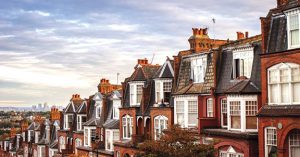Bloomberg
London house prices flatlined, recording their worst performance in more than three years, one of the UK’s biggest mortgage lenders said.
The cost of an average home in the capital hit £530,396 ($637,720) in January, unchanged from a year earlier, according to Halifax. This was the slowest rate of growth since November 2019, when prices fell by 1% from the previous year.
Compared to a month earlier, prices fell 2% from £541,472. While London’s house price growth has lagged many other areas of the UK “for some time,†according to Halifax, the price of a typical home is still around a quarter of a million pounds above the UK national average.
The signs of a slowdown in the UK’s largest city came as Britain’s wider housing market stabilized in January, breaking four months of decline.
Halifax said its measure of property prices was unchanged last month after an 1.3% drop in January. It said the annual pace of growth slowed to 1.9% from 2.1%.
The figures indicated more strength than rival lender Nationwide Building Society, which recorded the longest string of declines since 2008 in its widely watched figures. The two lenders calculate house prices based on the mortgages they write for homebuyers. Both expect the market to weaken this year along with the economy and consumer spending power.
“We expected that the squeeze on household incomes from the rising cost of living and higher interest rates would lead to a slower housing market, particularly compared to the rapid growth of recent years,†said Kim Kinnaird, director of Halifax mortgages. “As we move through 2023, that trend is likely to continue as higher borrowing costs lead to reduced demand.â€
Halifax said this month’s figures represent the weakest in three years, since the pandemic brought the property market to a standstill. The rate of growth slowed across all regions.
Prices are down around 4% from their peak in August last year, Kinnaird said on Bloomberg Radio. But they are still up more than 18% on pre-pandemic levels.
Kinnaird said she expects to see prices continue to slide throughout the year. “But I also think it’s important to view those price changes in the context of the last few years where we’ve seen really rapid growth and historically low interest rates.â€
Potential buyers have been deterred by rising mortgage costs, as the Bank of England has bumped up its base interest rate to tame inflation, and the soaring cost of living.
Martin Beck, chief economic adviser to forecasting group the EY ITEM Club, noted that mortgage rates were still close to their highest in a decade despite falling from the peaks seen after then-Chancellor of the Exchequer Kwasi Kwarteng’s budget spooked investors and sent interest rates in financial markets spiraling.
“January’s flatlining in values may prove only a temporary interruption to a trend of falling prices,†Beck said. “Households’ ability to service debts is being squeezed by falling real incomes, and widespread predictions of a decline in property values are expected to encourage some potential buyers to wait before purchasing, weighing on demand and potentially making expectations of price falls self-fulfilling.â€
 The Gulf Time Newspaper One of the finest business newspapers in the UAE brought to you by our professional writers and editors.
The Gulf Time Newspaper One of the finest business newspapers in the UAE brought to you by our professional writers and editors.
